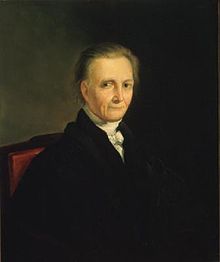Corfield v. Coryell: The Privileges and Immunities Clause
Historical
In Corfield v. Coryell, 6 F. Cas. 546 (1823), Supreme Court Justice Bushrod Washington interprets the Privileges and Immunities Clause of Article 4, Section 2 and articulates a list of fundamental rights guaranteed by the U.S. Constitution.
Although he authored the opinion while sitting as a circuit judge, this early reference to fundamental rights not expressly stated in the Constitution foreshadows Twentieth Century Constitutional law. What is even more interesting about Corfield is that Justice Washington had no problem applying the Article 4, Section 2 Privileges and Immunities Clause to the states. A decade later, Justice Marshall’s opinion in Barron ex rel. Tiernan v. Mayor of Baltimore, 7 Pet. 243 (1833) holds that the Bill of rights does not apply to the states. Under Marshall’s reasoning, the articles, including the privileges and immunities clause, do not apply to the states either although Corfield was never reversed.
Even after the Civil war amendments to the Constitution, when the Court had the opportunity to interpret the Privileges and immunities Clause of the 14th Amendment, the Supreme Court did not use either the Article 4, Section 2 Privileges and Immunities clause or the 14th Amendment Privileges and Immunities clause. Instead the Court chose to use the 14th Amendment Due Process clause to find fundamental rights not expressly enumerated in the constitution and make them applicable to the states.
The Facts of the Case
Mr. Corfield, a citizen of Delaware, challenged the validity of a New Jersey statute which prohibited “any person who is not, at the time, an actual inhabitant and resident in this State” from raking or gathering “clams, oysters or shells” in any of the waters of the State, or on board any vessel “not wholly owned by some person, inhabitant of and actually residing in this State…”
Corfield argued that the New Jersey law violated the U.S. Constitution’s “Privileges and Immunities Clause.” Article IV, Section 2 of the Constitution specifically states that “the citizens of each state shall be entitled to all privileges and immunities of citizens in the several states.”
The Court’s Decision
As stated by Justice Washington, the central issue in the case was how to define the “privileges and immunities of citizens in the several States.” In the court’s opinion, the protection afforded by the Constitution extends only to fundamental rights.
“We feel no hesitation in confining these expressions to those privileges and immunities which are, in their nature, fundamental; which belong, of right, to the citizens of all free governments; and which have, at all times, been enjoyed by the citizens of the several States which compose this Union,” Justice Washington’s opinion explains.
While Justice Washington acknowledged that it would be too tedious to list all of the fundamental rights, he provided the following list:
Protection by the Government; the enjoyment of life and liberty, with the right to acquire and possess property of every kind, and to pursue and obtain happiness and safety; subject nevertheless to such restraints as the Government must justly prescribe for the general good of the whole. The right of a citizen of one State to pass through, or to reside in any other State, for purposes of trade, agriculture, professional pursuits, or otherwise; to claim the benefits of the writ of habeas corpus; to institute and maintain actions of any kind in the courts of the State; to take, hold and dispose of property, either real or personal; and an exemption from higher taxes or impositions than are paid by the other citizens of the State…
With regard to specific issues of the case, the court held that the State of New Jersey was not required to grant “co-tenancy in the common property of the State, to the citizens of all the other States.” Accordingly, it found the state statute was constitutional. In highlighting the boundaries of the Privileges and Immunities Clause, Justice Washington wrote:
We cannot accede to the proposition . . . that, under this provision of the Constitution, the citizens of the several States are permitted to participate in all the rights which belong exclusively to the citizens of any particular State, merely upon the ground that they are enjoyed by those citizens; much less, that in regulating the use of the common property of the citizens of such State, the legislature is bound to extend to the citizens of all other States the same advantages as are secured to their own citizens.
Previous Articles
Supreme Court Rejects Moment of Threat Doctrine in Deadly Force Case
by DONALD SCARINCI on June 30, 2025
In Barnes v. Felix, 605 U.S. ____ (2025), the U.S. Supreme Court rejected the Fifth Circuit Court o...
SCOTUS Holds Wire Fraud Statute Doesn’t Require Proof Victim Suffered Economic Loss
by DONALD SCARINCI on June 24, 2025
In Kousisis v. United States, 605 U.S. ____ (2025), the U.S. Supreme Court held that a defendant wh...
SCOTUS Holds Wire Fraud Statute Doesn’t Require Proof Victim Suffered Economic Loss
by DONALD SCARINCI on June 17, 2025
In Kousisis v. United States, 605 U.S. ____ (2025), the U.S. Supreme Court held that a defendant wh...
The Amendments
-
Amendment1
- Establishment ClauseFree Exercise Clause
- Freedom of Speech
- Freedoms of Press
- Freedom of Assembly, and Petitition
-
Amendment2
- The Right to Bear Arms
-
Amendment4
- Unreasonable Searches and Seizures
-
Amendment5
- Due Process
- Eminent Domain
- Rights of Criminal Defendants
Preamble to the Bill of Rights
Congress of the United States begun and held at the City of New-York, on Wednesday the fourth of March, one thousand seven hundred and eighty nine.
THE Conventions of a number of the States, having at the time of their adopting the Constitution, expressed a desire, in order to prevent misconstruction or abuse of its powers, that further declaratory and restrictive clauses should be added: And as extending the ground of public confidence in the Government, will best ensure the beneficent ends of its institution.





